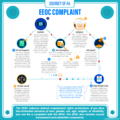Ageism facts for kids
Ageism is when someone is treated unfairly just because of their age. This unfair treatment, called discrimination, can come from one person or from a whole group of people in society. It means someone might be left out or treated badly because of how old they are.
Ageism can affect both older people, sometimes called senior citizens, and young people. For example, it can happen when someone is looking for a job. A company might choose to hire a person who is around 30 years old instead of someone who is 50, or even someone who is 20, even if all of them have the same skills.
The BBC, a big broadcasting company in the United Kingdom, has faced many complaints about ageism. This kind of discrimination is also common in the entertainment industry, where how a person looks is often seen as very important.
Contents
What is Ageism?
Ageism is a type of discrimination where people are judged or treated differently because of their age. It's like judging someone based on their facial features, height, or skin color, but instead, it's about how old they are. This can lead to unfair rules or ideas about what people of certain ages can or cannot do.
How Ageism Works
Ageism can show up in many ways. Sometimes it's obvious, like not hiring someone because they are "too old" or "too young." Other times, it's more hidden, like making jokes about someone's age or having stereotypes about what older or younger people are like. These stereotypes are often not true and can hurt people.
Who Does Ageism Affect?
Ageism can affect anyone, but it usually targets two main groups:
- Older people: They might be seen as less capable or too slow.
- Young people: They might be seen as not experienced enough or not serious.
Both groups can face challenges because of these unfair ideas.
Ageism Against Older People
Older people often face ageism in the workplace. For example, they might find it harder to get a new job or get promoted. Some people might think that older workers are not good with new technology or that they will retire soon. These ideas are often wrong and can stop skilled people from working.
Ageism can also affect how older people are treated in daily life. They might be talked down to, or their opinions might not be taken seriously. This can make them feel invisible or unimportant.
Ageism Against Young People
Young people, sometimes called "minors," also face ageism. There are many laws that set age limits for young people. For example, in many places, young people cannot vote, drive a car, or work certain jobs until they reach a specific age.
While some age limits are for safety, others can be seen as ageism. For instance, some people might think that young people are not responsible enough to make important decisions. This can lead to young people feeling like their ideas or feelings don't matter.

Where Does Ageism Happen?
Ageism can happen in many places, including:
- Workplaces: As mentioned, it can affect hiring, promotions, and how people are treated at work.
- Media and Entertainment: TV shows, movies, and advertisements sometimes show older or younger people in unfair ways.
- Healthcare: Sometimes, doctors might not take health concerns of older or younger patients as seriously because of their age.
- Social Settings: People might make ageist jokes or comments in everyday conversations.
Fighting Ageism
Many people and groups are working to stop ageism. They try to raise awareness about the issue and change unfair laws or practices. For example, the Equal Employment Opportunity Commission (EEOC) in the United States helps people who have faced age discrimination at work.

Organizations like AARP (formerly the American Association of Retired Persons) work to support older people and fight ageism. Groups like the National Youth Rights Association also work to protect the rights of young people. The goal is to make sure everyone is treated fairly, no matter their age.
Images for kids
-
AARP booth at Boston Pride Festival, 2017
-
National Youth Rights Association members protesting the voting age in Berkeley, California (2004)
See also
 In Spanish: Discriminación por edad para niños
In Spanish: Discriminación por edad para niños
 | Chris Smalls |
 | Fred Hampton |
 | Ralph Abernathy |





